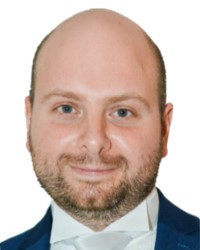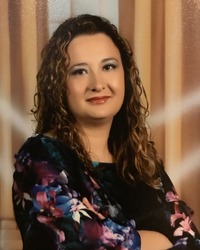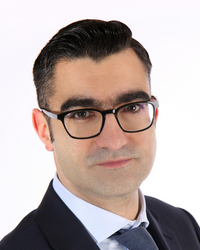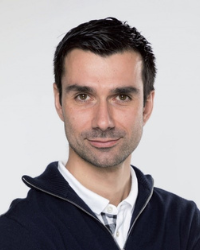Study options
- Starting in
- September 2025
- Location
- Distance Learning
- Fees
- Home: £6,500
Overseas: £9,500
EU/EEA/Swiss students
What you'll study
You will gain a thorough theoretical training in aesthetic medicine, with a particular focus on non-operative techniques. Explore the science and principles behind sought-after procedures, including botulinum toxin injections, dermal fillers, and laser treatments.
This programme specifically focuses on complementing your existing practical skills with knowledge on key issues in the aesthetic medicine profession, as well as evaluation and self-appraisal, and autonomy in the planning and management of learning. As such, the information covered is designed for you to develop an improved theoretical understanding of procedures, patient management, and key issues, rather than explicit practical training in aesthetic medicine techniques.
We have a large number of specialists teaching on the course, and many are world leaders in their fields. These include academics from other institutions, clinicians, and specialists from the medical industry.
Through interactive webinars and online lectures, videos and literature, you will gain confidence in a number of skills including evaluation and self-appraisal, and autonomy in the planning and management of learning. You also have the chance to put your learning to the test via optional simulation training.
Many of our students choose to progress onto the PGDip in Aesthetic Medicine which covers further modules such as 'Medicolegal Aspects and Patient Psychology', 'Regenerative and Cell Based Approaches', 'Advanced Aesthetic Modalities', and Principles of Practice Management. Many then go on to the MSc in Aesthetic Medicine (to complete a dissertation) to further their theoretical knowledge and understanding of other areas of aesthetic medicine, or develop their research skills.
Students* gave this programme a score of 100% across all aspects of teaching, skill development, staff engagement as well as 100% overall satisfaction.
*Students who completed the Postgraduate Taught Experience Survey (PTES) 2024
Structure
- Four compulsory taught modules:
- End-of-year Objective Structured Clinical Examination (OSCE)
Compulsory/Core modules
This module focuses on principles of skin anatomy/physiology as well as wound healing/scarring processes and hair biology. Dedicated sections address extrinsic and intrinsic factors involved in the ageing process as well as principles of subjective and objective methods of skin assessment.
This module focuses on the history, pharmacology, reconstitution and administration of toxins as well as the classification, rheological characteristics of common filler products. Dedicated sections address basic injection techniques as well as principles of complication management.
The module covers important aspects relevant to aesthetic dermatology by highlighting the most relevant range of skin lesions encountered in aesthetic practice and pertinent management principles. Dedicated sections address skin care agents, common hair and pigmentary disorders, acne as well the principles of injectable mesotherapy and microneedling.
This module serves as an introduction to laser and other energy based device modalities. It highlights biophysics of light-tissue interactions and elaborates upon the different classes of devices (vascular, resurfacing and pigment specific lasers). Dedicated sections address novel modalities for skin tightening/fat reduction as well as other light based applications including intense pulse light (IPL).
Assessment
- Each module is assessed with a multiple choice question (MCQ) assessment and a 2,000-word essay
- You will also undertake an objective structured clinical examination (OSCE) at the end of each academic year
—I am the founder of Smileworks, one of the largest independent dental practices in the UK. I finished my MSc in Aesthetic Medicine in 2016 and it has been transformational. The course at Queen Mary was perfect because it’s academic and I wanted to support my day-to-day practical work with some academic research. It was ideal for advanced practitioners who know the direction they want to take. I was able to build knowledge through my postgraduate degree whilst working in practice, which was ideal. I learnt things I wouldn’t have otherwise, to the huge benefit of my patients. This just wouldn’t have been possible without that additional MSc under my belt.
Dr MJ Rowland-Warmann (MSc Aesthetic Medicine 2016)
Teaching
This course has been developed and is taught by practising professionals and industry experts. We have a large number of specialists teaching on the course, and many are world leaders in their fields. In addition to a series of interactive online webinars, lectures, videos and literature from academics, you’ll gain invaluable insight from guest speakers and develop communication skills in seminars and lively group discussions. We also encourage practical learning, and you will have the opportunity to take part our optional simulation day where you will experience innovative procedures first-hand. We also incorporate bespoke online learning tools such as our own app for simulation-based assessments. You will be expected to complete further hours of independent study. You’ll take an active role in your own learning by reading designated material, producing written assignments and completing projects.
To help you along your journey, you’ll also be assigned a Student Adviser, who will guide and support you in both academic and pastoral matters throughout your course. You will also be supported by your programme administrator who is responsible for the day-to-day organisation and management of the programme and is on-hand to facilitate a positive learning environment and support your engagement during your studies. The Blizard Institute's team of dedicated education administrators recently received an Education Excellence Award for their work.
Blizard Institute distance learning (online) students* gave their experience a score of 99% for overall satisfaction.
*Students who completed the Postgraduate Taught Experience Survey (PTES) 2024
Where you'll learn
Facilities
- Access to Queen Mary’s dedicated online portal, QMplus
- Weekly online material complemented by clinical pictures
- Supplementary reading and a selection of relevant journal articles
- Student Café — this area of the site allows pictures and questions or messages to be posted for discussion within the group. The current students find this a useful way of interacting with other students
- Access to our campus facilities if you decide to visit at any point during your course
About the Institute
Blizard Institute
The Blizard Institute is the largest institute of the Faculty of Medicine and Dentistry. Our research and education span broad areas of modern biomedicine, with particular expertise in cell biology, genomics, immunology, neuroscience, primary care, population health and trauma sciences.
Our research puts Queen Mary joint seventh in the UK (REF 2021). We work closely with linked NHS hospital trusts which means that the School’s research and teaching is informed by an exceptionally wide-ranging and stimulating clinical environment.
Barts Health NHS Trust is home to:
- One of the capital's leading trauma and emergency care centres in the UK (approaching 1,000 attendances daily)
- Europe’s largest Trauma Centre
- Europe’s busiest Heart Centre.
Queen Mary University is also part of the prestigious Russell Group - a body of leading UK universities dedicated to research and teaching excellence.
Career paths
After completing the Aesthetic Medicine programme, you will have developed comprehensive knowledge of the field along with valuable skills for improved learning and critical appraisal. You will be able to apply the knowledge to improve your own clinical practice.
Many of our graduates go on to prestigious positions in aesthetic medicine, within medical clinics, the NHS and other national health systems in their respective countries. Many are working in positions such as:
- Aesthetic Nurse Practitioner
- Dermatologist
- Facial Aesthetics Doctor
- Plastics Surgeon
Source: Graduate Outcomes Surveys 2019/20 and 2020/21
- 96% of Blizard postgraduate-taught students are in employment or further study (2020/21)
- 98% of Blizard postgraduate-taught students are in highly skilled work or study (2020/21)
- £47k is the median UK salary of Blizard postgraduates (2020/21). 87% of our graduates earn above this.
Fees and funding
Funding
There are a number of ways you can fund your postgraduate degree.
- Scholarships and bursaries
- Postgraduate loans (UK students)
- Country-specific scholarships for international students
Our Advice and Counselling service offers specialist support on financial issues, which you can access as soon as you apply for a place at Queen Mary. Before you apply, you can access our funding guides and advice on managing your money:
Entry requirements
UK
Degree requirements
A 2:2 or above at undergraduate level in Nursing with minimum four years of experience in Nursing, or a Medical or Dental degree (non-UK medical degrees marked on a grading scale must be equivalent to UK 2:2 degree).
Applicants with Nursing, Medical or Dental degrees below this level will be considered on an individual basis if there is strong evidence of suitable professional experience.
Find out more about how to apply for our postgraduate taught courses.
International
English language requirements
The English language requirements for our programmes are indicated by English bands, and therefore the specific test and score acceptable is based on the band assigned to the academic department within which your chosen course of study is administered. Note that for some academic departments there are programmes with non-standard English language requirements.
The English Language requirements for entry to postgraduate taught and research programmes in the Blizard Institute falls within the following English band:
Band 4: IELTS (Academic) minimum score 6.5 overall with 6.0 in each of Writing, Listening, Reading and Speaking
Please note, there are some postgraduate programmes with non-standard English language requirements in this Institute.
We accept a range of English tests and qualifications categorised in our English bands for you to demonstrate your level of English Language proficiency. See all accepted English tests that we deem equivalent to these IELTS scores.
Visas and immigration
Find out how to apply for a student visa.






.png)
